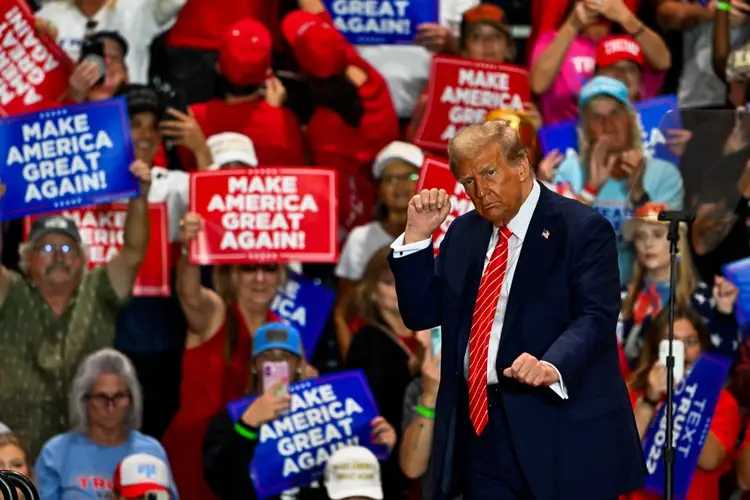We’ve all learned the hard way about protest votes and Trump – don’t do it

Weekly Voices: Controversial Columns & Insights
Subscribe To Our Free Weekly Voices Newsletter!
Join Our Free Weekly Voices Newsletter
I’d appreciate receiving emails about promotions, events, and news from The Independent. Please take a look at our privacy policy.
As election day in North Carolina approached its conclusion, many voters gathered around their TVs and mobile devices, eager to find out how the crucial swing states would tilt in this election. I was among them.
For me, along with many of my friends and family, this outcome has introduced a whole new wave of fear and disappointment. We were the first battleground state to shift, the first to see Donald Trump make us a Republican stronghold once again. Even with our Democratic governor and attorney general Josh Stein winning, the Republicans still asserted control over the state. The difference in votes was extremely narrow, but in the end, it wasn’t sufficient. Now, the lingering question we all have is: why did this happen?
I have a sense of what the responses might be. This year, the region has experienced unimaginable sorrow. The impact of Hurricane Helene's destruction is still being felt. Additionally, the limited assistance offered by federal programs such as FEMA has not only disheartened voters in some instances but has also made it physically impossible for many to reach polling stations. Just a few weeks ago in Asheville—my college town—entire communities, shops, structures, and roadways were wiped out by flooding, leaving hundreds of thousands without power, food, or access to clean water.
Not being able to vote is one issue, but what about choosing not to participate? I recall how much people talked about "protest votes" during the 2016 election between Hillary Clinton and Donald Trump. Now, I've had discussions with my peers from Gen Z and millennials who decided to abstain from voting or went with a third-party candidate. They’ll now face the consequences of a Trump presidency for the next four years.
I get why some people choose to opt out entirely. The system has serious issues, and many would say it’s beyond fixing.
Back in 2016, when Bernie Sanders ran in the primaries, I was totally on board—along with many other young Americans, I felt a sense of hope for a new future with him in the race. However, when Hillary Clinton emerged as the nominee for the Democrats, a significant number of young voters decided to step away from the polls entirely, either choosing not to vote or opting for third-party candidates in the final election. I was one of them and ended up watching Trump win in my state. At that time, despite my guilt and disappointment, I reassured myself that it didn’t really matter since my county, Buncombe, still voted for the Democrats.
There’s been a lot of talk suggesting that people who choose not to vote for the major parties, or who vote for third-party candidates, are doing so in "blue states," which means their choices don’t really matter. However, today’s events show this isn’t the case. Looking back and based on my experiences, I firmly believe that what we’re experiencing right now—another four years of conflict and misinformation—clearly highlights the importance of exercising our constitutional rights. It's evident that many issues we believed were settled in federal law are actually still being contested.
Kamala Harris appeared to attract a significant share of the young vote with her “Brat” campaign, which utilized clever advertisements, engaging memes, and short videos on TikTok. However, that approach fell short. Her shift to a more centrist position on topics like Israel's actions against Palestine, along with her background as a prosecutor, deterred many voters—especially younger ones—from participating in the election. This kind of "protest vote" ultimately backfired.
The irony in this situation is that someone like Harris — despite differing opinions on parts of her foreign policy or her history — was scrutinized excessively by individuals who might have otherwise supported her. In contrast, Trump supporters were willing to accept all of his statements, no matter how outrageous or even illegal they were.
People are living in fear, and that fear has been manipulated. As an international voter residing in the UK, I often think about how many individuals living outside of their home country decided against voting—especially those who might have been influenced by the harshness of online discussions and the misinformation propagated by Elon Musk. It's astonishing to me that someone who was able to provoke the events of January 6 could potentially have another opportunity to approach the White House.
The consequences of this election will be significant and enduring. It concerns me for women, for my nation, and for what lies ahead. It’s astonishing to see how Harris was judged by such unfair expectations, while Trump is free to say and do anything he chooses without consequence.
Nevertheless, we should stay hopeful. It's tempting to give in to fear and regret, to blame others, and to let the intensity of the situation cloud our judgment. But we can't allow that to happen. This is an important moment for us to connect with our community, to actively work on preserving and restoring our freedoms, to appreciate our differences, and to ensure that our leaders are held responsible for their actions.
Everyone has the right to hold onto hope, to feel secure in their own home, to express their true selves, to have climate change recognized instead of dismissed, and to trust that our government prioritizes what it truly means to be American: being free.







































